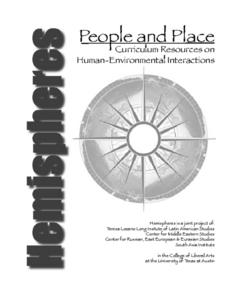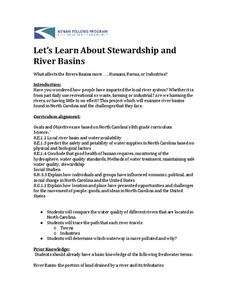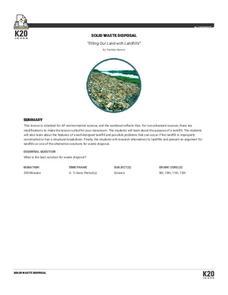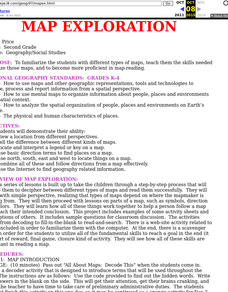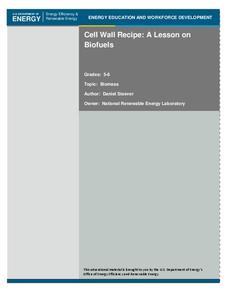Curated OER
The Day After Tomorrow: How is the Density of Water Related to Climate Change and Global Warming?
Science learners simulate what happens when ice breaks up and floats on water and how increased pressure on ice causes it to melt faster. They view a clip from the movie, The Day After Tomorrow, and relate their lab activities to what...
Cornell University
Fibers, Dyes, and the Environment
Nanofibers can be made through electrospinning or force spinning in order to reduce the negative impact on the environment. Pupils study the role of fibers and dye on the environment through a series of five hands-on activities. Then,...
Curated OER
Big Dam Construction in India
This complete and full resource includes everything needed to conduct a lesson on the environmental impact of large dams in India. Background information, handouts, answer keys, and web links are all there to help you educate your class...
King Country
Lesson 1: Introductory Class
This first lesson in a unit on Family Life and Sexual Health (FLASH) has class members establishing the rules of behavior that will create a safe environment for the discussion of these sensitive topics.
Virginia Department of Education
Go with the Flow
How does nature's hierarchy relate to our local human environment? Answer this question, along with others, as the class visually depicts the natural hierarchy provided by nature. Pupils discuss each piece of the pyramid and its energy...
National Library of Medicine
Your Environment, Your Health: Chemicals in Your Home
Many people know about chemical pollution, but are all chemicals bad? The third unit in a series of six addresses chemicals common in everyday life. Scholars learn about the chemicals found in their own homes, chemical safety, and...
Channel Islands Film
Human Impact on the Food Web of Santa Cruz Island
What happens when a non-native species is introduced onto an island? Santa Cruz Island, part of the Channel Island chain located off the coast of southern California, provides the perfect laboratory for young environmental scientists to...
Kenan Fellows
Let's Learn About Stewardship and River Basins
What does it mean to be a good steward? Middle school environmentalists learn to care for their state's waterways through research, a guest speaker, and poster activity. Groups must locate and learn more about a river basin and the human...
Earth Day Network
Staying Green While Being Clean
Clean up the environment with a lesson that focuses on replacing hazardous cleaning supplies with green, environmentally-friendly products. Using a dirty patch of surface as a control area, kids clean other parts of various surfaces...
Howard Hughes Medical Institute
Got Lactase? The Co-Evolution of Genes and Culture
Does the human body evolve as quickly as human culture? With a stellar 15-minute video, explore the trait of lactose intolerance. Only about 1/3 of human adults seem to still have the enzyme lactase and therefore, the ability to digest...
University of Minnesota
Mirroring Emotions
Do you ever give your class the "teacher look"? Without saying a word, they become silent and engaged (hopefully). How do they know what you're thinking? Explore the concept of nonverbal communication and how it relates to our mirror...
Michigan State University
Bug Lyphe!
Introduce ecology classes to biodiversity and interdependence in ecosystems with a PowerPoint presentation. Then, they get up-close and personal with the invertebrate world by collecting insects, classifying them, and graphing their...
Howard Hughes Medical Institute
Lactose Intolerance: Fact or Fiction
Around the world, about 2/3 of adult humans are lactose intolerant. Scholars work in small groups to discuss a few statements about lactose intolerance. Then, they watch a video on the topic and readdress each statement. Whole-class...
Polar Bears International
Taking Action!
Motivate young scientists to stand up and take action with this environmental science lesson. To begin, the class works in small groups brainstorming actions that support the conservation of the earth before creating and implementing an...
Smarter Balanced
Environmental Interdependence (Environmental Awareness)
Whether introducing a study of environment awareness or preparing your classes for a performance task related to environmental interdependence, you will find this resource useful. Key terms and concepts are introduced so that all...
K20 Learn
Filling Our Land with Landfills: Solid Waste Disposal
New ReviewThough it comprises only 5 percent of the world's population, the US generates 40 percent of the world's waste. Scholars learn about landfills, their safety, and other solid waste methods. They use experiments and research to learn more....
Environmental Protection Agency (EPA)
Teachers' Guide to Using A Day In the Life of a Drop
Hydrology hopefuls learn about their local watershed. Through discussion and online interactives, they see that their habits affect the water supply. The instructional activity concludes with a pledge to filter out bad water usage...
Curated OER
Biodiversity Debate - Stream Side Science
Role play community members who are both for and against the construction of a dam. Research the pros and cons and then hold a classroom debate. This activity ideally follows a series of stream studies, links to which are included. Use...
National Geographic
Mapping the Americas
Celebrate the geography of the Americas and develop map skills through a series of activities focused on the Western Hemisphere. Learners study everything from earthquakes and volcanoes of the Americas and the relationship between...
Curated OER
Map Exploration
Are you looking for a terrific lesson on map activities for your second graders? Then, this resource is for you! The activities range from decoding, to fill-in-the-blank, to read-and-search. There is a website activity related to maps...
Science 4 Inquiry
Enzymes in Action
Enzymes play a role in almost every function in the human body. Scholars explore three variables related to the use of enzymes. They observe a catalase reaction, experiment with substrates, and examine reactions rates.
Curated OER
Cell Wall Recipe: A Lesson on Biofuels
Biotech engineers discover that changes in the DNA code for cell wall formation can help create crops better suited for biofuel production. They extract DNA from wheat germ. They decode paper strips with codes and relate the activity to...
Science Matters
Island Fox Outreach
Off the coast of California lives a wild animal called the Island Fox. Experts discuss the importance of the Island Fox to the Channel Islands and the balance the fox creates within its ecosystem. The lesson concludes with a reading of...
Curated OER
They're Tilling that Field Behind the Mall
Unfortunately, the article for which this resource was written is not available. You can, however, find another current document on agriculture and urban development for your class to read together, and then still follow the suggested...




